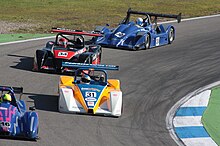

Group CN is a category of vehicles used in motorsport, introduced by the FIA in 1993 for sports car racing.[ citation needed ] Group CN cars are mainly used in hillclimbing championships or sports racing series. Group CM is a non-FIA class which is closely related to Group CN.